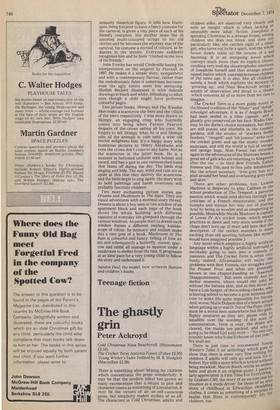Teenage fiction
The ghastly grin
Peter Ackroyd
Cold Christmas Nina Beachcroft (Heinemann £2.10) The Cricket Term Antonia Forest (Faber £2.50) Young Winter's Tales 5edited by M. R. Hodgkin (Macmillan £2.50)
There is something about writing for children which concentrates the prose wonderfully; it may be that the modern novel has grown so many excrescences that a return to plot and character comes as something of a revelation, it may be the virtues of an un-self-conscious prose, but simplicity makes stylists of us all. The characters in Cold Christmas, adults and Spectator December 7, 1974 children alike, are observed very closely and with an insight which is often lacking in ostensibly more 'adult' fiction. Josephine is spending Christmas in a strange house, among children she does not know and does not particularly like; she catches sight of a small girl, who turns out to be a spirit, and the whole house slowly takes on the strains of a sad haunting. It is an intriguing novel which conveys much more than its explicit theme, catching very well the claustrophobic emotions of Josephine herself and that strange uncoiltained malice which can existbetween children of the same age. It is also, like all children's novels, a book which explores the mystery of 'growing up,' and Nina Beachcroft brings 3 wealth of observation and detail to a theme imagine.
Theall of us more than we care to
The Cricket Term is a more giddy novel, in the blessed tradition of the "blissy" and "delish" schoolgirl adventure; it is as if Angela Brazil had been sealed in a time capsule, and a, ghastly grin preserved on her face. 'Radio one' may be the dorm's choice nowadays, but there are still ponies, and bluebells in the country gardens, still the strains of "starkers feeble bonkers," "magnif' and "oh lummy" echo over the cricket green and up the musty wooden, staircases, and still the world is full of `sw0Ps and sponge bags. Miss Forest has returned again to the adventures of the Marlowe breed, a great set of gals who are returning to Kingscote after the vac — to their Best Friends, Esther Frewen and Tim, and to less jolly inhabitants like the school secretary: "iron-grey hair in a plait around her head and everlasting grey coat and skirt." There are other problems, too. Lawrie Marlowe is desperate to play Caliban in the school production of The Tempest, a perverse passion which would send shivers through the criticism of a French structuralist, and she humphs and stamps her way out of playing Arid l by being as wooden and as unsporting as possible. Meanwhile Nicola Marlowe is captain of Lower IV A's cricket team, which means practices at dawn and very stern words if the chaps don't turn up. (1 must add here that the description of the cricket matches is more exciting than old sporting failures like myself would have imagined possible.) Any novel which employs a highly artificial language within a highly artificial surround is, inevitably going to turn intoa comedy or manners, and The Cricket Term is often very funny indeed. Aficionados will enjoy the problems with Best Friends, the struggles over the Prosser Prize and what are generallY known in one chapter-heading as "Assorted Disappointments." But even comedy has it5 darker moments, where would the joke be without the banana skin, and in this novel w,_ e have a Lois Sanger, of the scalding cheeks, wn°, is leaving school to become a gym mistress and tries to make life quite impossible for Nicol,' And, worse, Marie Dobson dies of a heart-attack when getting up to watch Top of the Pops; there must be a moral here somewhere but the girls, flighty creatures as they are, pause only to squabble over the wording of the note ertahteiotnr.unTkesrmaries poavcekred, theanddeswksh aart,s marmedis, cnole
going to be Head Girl next term — "No one possibly know who'll she'll choose of our year We shall see. Yourl There is just time to recommend
Winter's Tales 5, an anthology which goes_r_u... show that there is some very fine writing r?.`. children if adults will only go and look for lt Robert Nye tells a story which is lyrical without being mawkish, Martin Booth retells an animul fable and gives it an original point. partic
I
larly appreciated 'A First Time For EverYthin,gi"_ by Graham Cliff, the story of an ex-con and n. troubles as a truck-driver: for those of us vv.t1°_ think of childhood in Edwardian swaddllIttg clothes, it comes as something of a surprise.. children, too.0
life t0 _
realise that there is contemporary


































 Previous page
Previous page